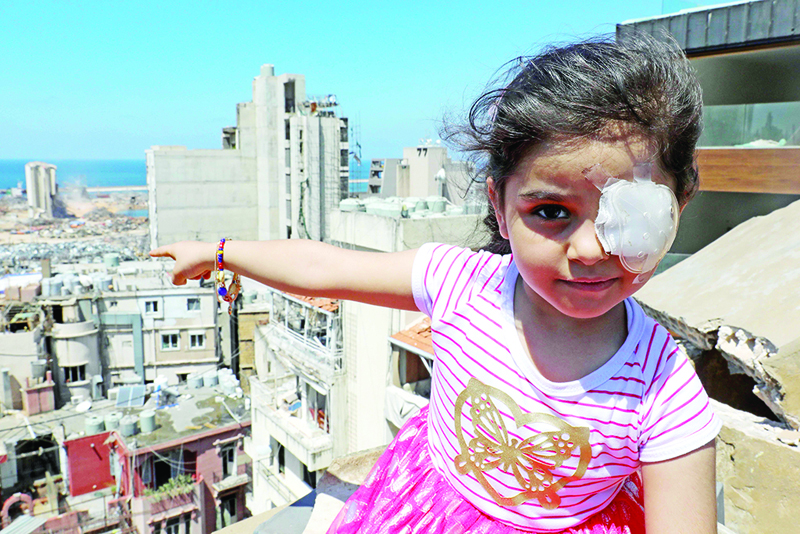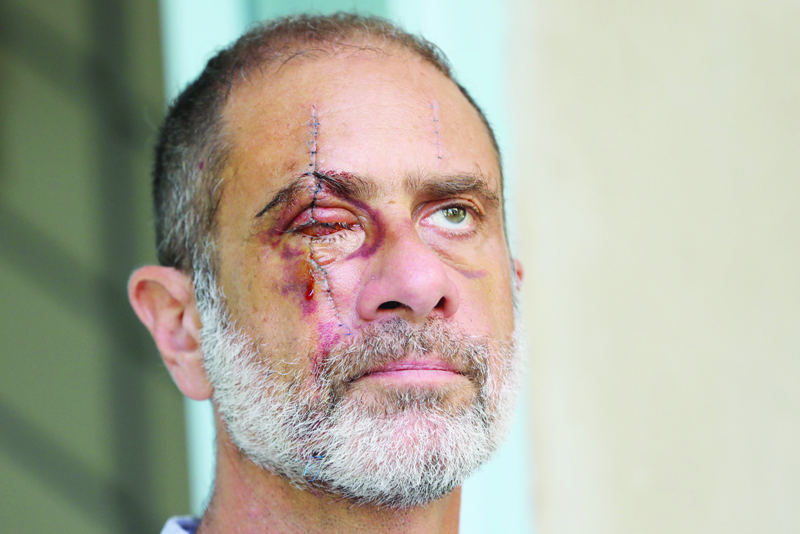
BEIRUT: A white plume, a huge orange blast and black smoke engulfing him: those were the last things Rony Mecattaf saw when the Beirut explosion maimed him and his city. "I have lost my whole lateral vision-and even maybe my self image," the 59-year-old psychotherapist said, blood still oozing from a large vertical gash that has destroyed his right eye. "When I look at myself in the mirror," he said, he now has to adjust to a new image, no longer the former "me with two eyes".

The powerful August 4 explosion that killed 177 people and devastated swathes of the Lebanese capital also left thousands wounded, mostly from flying shards of glass. At least 400 people suffered ocular injuries, more than 50 required surgery, and at least 15 were permanently blinded in one eye, according to data compiled by major hospitals in and around Beirut. Sitting in his office 10 days after the blast, on a couch usually reserved for his patients, Mecattaf repeatedly used a tissue to dab the long, stitched facial wound. "The blast effect," the therapist said drily, gesturing towards his injury.
Mecattaf was sitting on a friend's balcony overlooking the port when the explosion hurled him across the flat and against the front door as though he was a "speck of dust". He still doesn't know if it was the door or a flying fragment of the window that sliced through his eye. Doctors later told him that the pressure from the colossal blast alone could have literally caused his eyeball it to explode, making it all the more difficult to repair.
'Stages of loss'
In the chaotic and terrifying hours after the disaster, it took a "series of angelic interventions" for Mecattaf to finally get onto an operating table, he said. First a stranger on a tiny moped took him and zipped through the wreckage like a "madman" to get him to a hospital-but the clinic was so badly hit it turned him away. A Christian nun then happened to pull up her vehicle, yelled at him to get in and drove him to another hospital, which however also turned out to be out of service because of the blast.
"The city was a vision from hell," Mecattaf said. Finally, his friend arranged for an eye surgery in southern Lebanon. The operation took at least two hours. His eye could not be saved. Mecattaf said that nonetheless he was "luckier than most" blast victims, but he also admitted that losing an eye could feel like grieving for a dead person. "The five stages of loss or grief, I find there is something very similar here in what can happen."
'Half blind'
The port explosion of a stockpile of ammonium nitrate caused a blast wave so strong it shattered an inordinate amount of glass that was still being swept off the streets two weeks later. With windows shattering more than eight kilometers away, glass-related injuries accounted for a bulk of the 6,500 wounded. In an eye hospital north of Beirut, Maroun Dagher settled into an examination chair for his third checkup since the disaster. The 34-year-old web developer said the Beirut explosion "changed everything", with the loss of binocular vision turning even the simplest tasks into major challenges. Being able one day to pour Arabic coffee into miniature cups without spilling it would feel near-miraculous, he said.
Dagher's face had been close to a window, just a city block away from the habourside blast site, when the explosion blew a two-centimeter-long shard into his left eye. For the first few days afterwards, his pain was "just physical," he said, but his agony took on a new dimension when he was told his vision was most likely permanently impaired. Mornings have been especially difficult since. "I would have dreams that I could see everything and then I wake up," he said. "That's when you feel the bad emotions coming out. You just wake up half blind."
'Safest place'
Syrian construction worker Makhoul Al-Hamad, 43, from the city of Manbij in the north of his war-torn country, has been living in the same Beirut neighborhood since 1995. He used to believe that the capital's Mar Mikhael district was the "safest place in Lebanon". That is why his daughter Sama, born in Manbij when it was ruled by the Islamic State jihadist group, came to live with him in 2016 along with her mother and three siblings. She was just one year old at the time, and had celebrated her sixth birthday a few weeks before the port explosion.
Tragically, Sama was sitting close to a window when the blast also sent shards of glass flying into her left eye. On the roof of their damaged house, the wasteland that is now Beirut's port behind her, Sama smiled even though the eye was completely bandaged. With her retina blown out, doctors have told her parents she would need reconstruction surgery abroad-but her father simply can't afford it. Holding her in his arms, he said: "I wish all the suffering that befell people had hit me instead, if that would have spared Sama."- AFP




